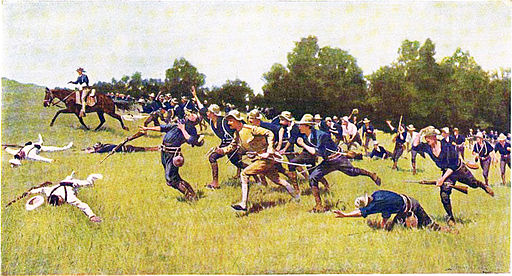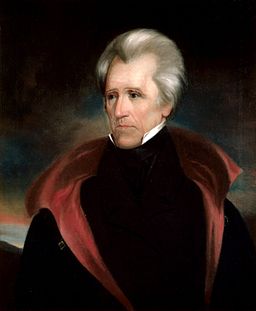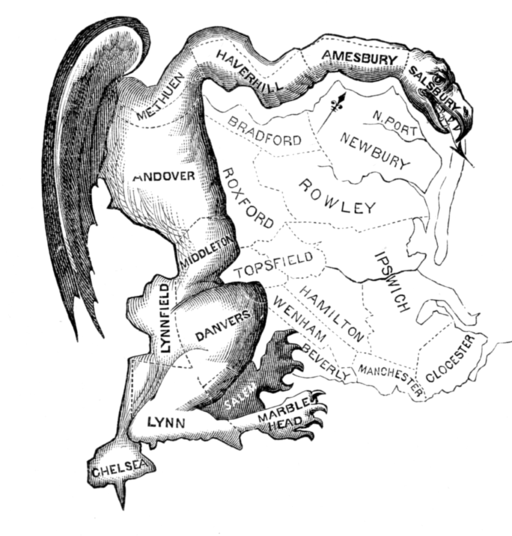Prick Up Your Ears

Charge of the Rough Riders at San Juan Hill, a painting by Frederic Remington (1861-1909).
― Izzy


Portrait of Andrew Jackson, the seventh president of the United States, painted by Ralph Eleasar Whiteside Earl (1785/88-1838).



This fall the Supreme Court will hear the case of Gill v. Whitford, a partisan gerrymandering case from Wisconsin, where redistricting lines drawn up by Republicans in the state legislature in 2011 after the 2010 census resulted in grossly unbalanced election results, such as in the 2012 election when, despite a majority of the votes statewide going to Democrats, Republicans nonetheless won sixty of the ninety-nine State Assembly seats. While the case is specifically about the redistricting lines drawn for state elections, there are implications for national elections because state legislatures also draw the lines for federal congressional districts. National election results have similarly tilted toward Republicans winning more seats in the House of Representatives than simple vote tallies warrant, and Democrats typically gain fewer seats than vote totals should grant them.

This gerrymandering case is a reminder of how failure to pay attention to state and local politics can result in a minority party exercising disproportional power. There are more important elections than the presidential one every four years. The party that turns people out for local school board elections, for city council elections, and for state legislature elections every year, year after year, is the party that ultimately takes power in the national elections. Those seemingly insignificant elections lay the groundwork and set the rules for what follows on a grander scale.
Motivated people turn out for elections, and Republicans have done a much better job over the past thirty or more years of motivating their people than Democrats have done with their people. They have done so with with some dubious tactics, it’s true, mainly motivating people through fear and loathing of The Other, whoever or whatever that might prove effective at the moment. That was easily seen in the 2016 election.
On a national scale, where state boundaries do not change, the Electoral College has worked to gerrymander the presidential election result on behalf of the Republican candidate as Democrats lose strength in the small towns and countryside of the middle of the country. For instance California, the most populous state in the nation, and one with a strong Democratic party majority, has 55 electoral votes (53 congressional districts plus 2 Senate seats) to offer the Democratic presidential candidate whether that candidate wins the state with a simple majority of one vote or an overwhelming majority of three million votes.
This is from a network television appearance by George Carlin in the early 1990s. No foul language warning necessary.
In the language of gerrymandering, Democrats are effectively “packed” into California and other highly urban states, mostly on either coast. Getting rid of the Electoral College and deciding the presidential election with a simple nationwide majority vote would eliminate this gerrymandering effect, but with Republicans controlling the Presidency, the Senate, the House of Representatives, the Supreme Court, 33 out of 50 governors’ offices, 31 out of 50 state houses, and 37 out of 50 state senates, that won’t be easy.


I spent 33 years and four months in active military service and during that period I spent most of my time as a high class muscle man for Big Business, for Wall Street and the bankers. In short, I was a racketeer, a gangster for capitalism. I helped make Mexico and especially Tampico safe for American oil interests in 1914. I helped make Haiti and Cuba a decent place for the National City Bank boys to collect revenues in. I helped in the raping of half a dozen Central American republics for the benefit of Wall Street. I helped purify Nicaragua for the International Banking House of Brown Brothers in 1902-1912. I brought light to the Dominican Republic for the American sugar interests in 1916. I helped make Honduras right for the American fruit companies in 1903. In China in 1927 I helped see to it that Standard Oil went on its way unmolested. Looking back on it, I might have given Al Capone a few hints. The best he could do was to operate his racket in three districts. I operated on three continents.
― Marine Major General (Retired) Smedley Butler, writing in the
Socialist newspaper Common Sense in 1935.
